- Home
- Leo Tolstoy
Collected Shorter Fiction, Volume 1 Page 4
Collected Shorter Fiction, Volume 1 Read online
Page 4
Chekhov:
In the Ravine
.
1901
Excommunicated by the Holy Synod of the Russian Orthodox Church. Writes
Reply to the Synod’s Edict
. Convalescing in Crimea, meets Gorky, Chekhov.
Chekhov:
Three Sisters
. Fadeyev born.
1902
Writes to the Tsar about the evils of autocracy and private land ownership. Finishes
What is Religion?
Gorky:
The Lower Depths
.
Death of Zola.
1903
Protests against anti-Jewish pogroms in Kishinyov and contributes three short stories for a benefit anthology published in Warsaw. Writes
After the Ball
.
Kuprin:
The Duel
.
1903–6
Writes
Reminiscences
.
1904
Death of brother Sergei. Finishes
Hadji Murad
. Writes a pamphlet against the war with Japan,
Bethink Yourselves!
, published in England. Writes
The Forged Coupon, Divine and Human
.
Chekhov:
The Cherry Orchard
.
Death of Chekhov.
Blok:
Verses about the Beautiful Lady
.
Bely:
Gold in Azure
.
1905
Writes
Alyosha Gorshok, Fëdor Kuzmich. The One Thing Needful seized by police
.
Rilke:
The Book of Hours
.
Sholokhov, Panova born.
Sologub:
The Petty Demon
(to 1907).
1906
Writes
What For?
Wife seriously ill
1907
Police raid Yasnaya Polyana and seize books.
Gorky:
Mother
.
Blok:
The Snow Mask
.
Bryusov:
The Fiery Angel
.
1908
Writes
I Cannot Be Silent
, a protest against the hanging of the 1905 revolutionaries. Tolstoy’s secretary Gusyev arrested and exiled. Chertkov returns from exile to live nearby.
Andreyev:
The Seven who were Hanged
.
HISTORICAL EVENTS
Student riots: temporary closure of universities.
Boer War begins.
Russia occupies Manchuria.
Social Democrat Party brings out newspaper The Spark.
Great Britain: Death of Queen Victoria; accession of Edward VII.
Wave of political assassinations in Russia.
Boer War ends.
Lenin’s faction (Bolsheviks) prevails at Social Democrat Party congress in London.
Massacre of Jews in Kishinyov.
Lenin launches newspaper Forward.
Russo-Japanese War (to 1905); Russian fleet destroyed in Tsushima Straits.
First Russian Revolution: Bloody Sunday, general strike, Tsar’s October Manifesto. Witte becomes First Minister.
Meeting of the first Duma (elected parliament).
Austria annexes Bosnia-Herzegovina.
DATE
AUTHOR’S LIFE
LITERARY CONTEXT
1908
cont
.
Growing quarrels with his wife and Chertkov about mss. and copyright ownership.
1909
Draws up will relinquishing copyright on his published works since 1881 and his unpublished works from before 1881. Chertkov expelled, goes to Moscow.
Bely:
The Silver Dove, Ashes, The Urn
.
Wells:
Tono-Bungay
.
1910
More quarrels with wife (now seriously unbalanced) about wills and copyright. Tolstoy leaves home and sets out to visit the monastery at Optina Pustyn. Taken ill on a train, he dies at the station of Astapovo on 7 November, aged 82. His body is buried without religious rites on the edge of the forest near Yasnaya Polyana.
Kuprin:
The Pit
.
Bunin:
The Village
.
Forster:
Howards End
.
Rilke:
Sketches of Malte Laurids Brigge
.
HISTORICAL EVENTS
Blériot flies the English Channel.
Great Britain: Death of Edward VII; accession of George V.
Street demonstrations and strikes in response to Tolstoy’s death.
THE RAID
A VOLUNTEER’S STORY
The portions of this story enclosed in square brackets are those the Censor suppressed; they were published in English for the first time in Aylmer Maude’s translation (1935).
Chapter I
[WAR always interested me: not war in the sense of manœuvres devised by great generals – my imagination refused to follow such immense movements, I did not understand them – but the reality of war, the actual killing. I was more interested to know in what way and under the influence of what feeling one soldier kills another than to know how the armies were arranged at Austerlitz and Borodinó.
I had long passed the time when, pacing the room alone and waving my arms, I imagined myself a hero instantaneously slaughtering an immense number of men and receiving a generalship as well as imperishable glory for so doing. The question now occupying me was different: under the influence of what feeling does a man, with no apparent advantage to himself, decide to subject himself to danger and, what is more surprising still, to kill his fellow men? I always wished to think that this is done under the influence of anger, but we cannot suppose that all those who fight are angry all the time, and I had to postulate feelings of self-preservation and duty.
What is courage – that quality respected in all ages and among all nations? Why is this good quality – contrary to all others – sometimes met with in vicious men? Can it be that to endure danger calmly is merely a physical capacity and that people respect it in the same way that they do a man’s tall stature or robust frame? Can a horse be called brave, which fearing the whip throws itself down a steep place where it will be smashed to pieces; or a child who fearing to be punished runs into a forest where it will lose itself; or a woman who for fear of shame kills her baby and has to endure penal prosecution; or a man who from vanity resolves to kill a fellow creature and exposes himself to the danger of being killed?
In every danger there is a choice. Does it not depend on whether the choice is prompted by a noble feeling or a base one whether it should be called courage or cowardice? These were the questions and the doubts that occupied my mind and to decide which I intended to avail myself of the first opportunity to go into action.
In the summer of 184—I was living in the Caucasus at the small fortified post of N—.]
On the twelfth of July Captain Khlópov entered the low door of my earth-hut. He was wearing epaulettes and carrying a sword, which I had never before seen him do since I had reached the Caucasus.
‘I come straight from the colonel’s,’ he said in answer to my questioning look. ‘To-morrow our battalion is to march.’
‘Where to?’ I asked.
‘To M. The forces are to assemble there.’
‘And from there I suppose they will go into action?’
‘I expect so.’
‘In what direction? What do you think?’
‘What is there to think about? I am telling you what I know. A Tartar galloped here last night and brought orders from the general for the battalion to march with two days’ rations of rusks. But where to, wh
y, and for how long, we do not ask, my friend. We are told to go – and that’s enough.’
‘But if you are to take only two days’ rations of rusks it proves that the troops won’t be out longer than that.’
‘It proves nothing at all!’
‘How is that?’ I asked with surprise.
‘Because it is so. We went to Dargo and took one week’s rations of rusks, but we stayed there nearly a month.’
‘Can I go with you?’ I asked after a pause.
‘You could, no doubt, but my advice is, don’t. Why run risks?’
‘Oh, but you must allow me not to take your advice. I have been here a whole month solely on the chance of seeing an action, and you wish me to miss it!’
‘Well, you must please yourself. But really you had better stay behind. You could wait for us here and might go hunting – and we would go our way, and it would be splendid,’ he said with such conviction that for a moment it really seemed to me too that it would be ‘splendid’. However, I told him decidedly that nothing would induce me to stay behind.
‘But what is there for you to see?’ the captain went on, still trying to dissuade me. ‘Do you want to know what battles are like? Read Mikháylovski Danílevski’s Description of War. It’s a fine book, it gives a detailed account of everything. It gives the position of every corps and describes how battles are fought.’
‘All that does not interest me,’ I replied.
‘What is it then? Do you simply wish to see how people are killed? – In 1832 we had a fellow here, also a civilian, a Spaniard I think he was. He took part with us in two campaigns, wearing some kind of blue mantle. Well, they did for the fine fellow. You won’t astonish anyone here, friend!’
Humiliating though it was that the captain so misjudged my motives, I did not try to disabuse him.
‘Was he brave?’ I asked.
‘Heaven only knows: he always used to ride in front, and where there was firing there he always was.’
‘Then he must have been brave,’ said I.
‘No. Pushing oneself in where one is not needed does not prove one to be brave.’
‘Then what do you call brave?’
‘Brave?… Brave?’ repeated the captain with the air of one to whom such a question presents itself for the first time. ‘He who does what he ought to do is brave,’ he said after thinking awhile.
I remembered that Plato defines courage as ‘The knowledge of what should and what should not be feared’, and despite the looseness and vagueness of the captain’s definition I thought that the fundamental ideas of the two were not so different as they might appear, and that the captain’s definition was even more correct than that of the Greek philosopher. For if the captain had been able to express himself like Plato he would no doubt have said that, ‘He is brave who fears only what should be feared and not what should not be feared’.
I wished to explain my idea to the captain.
‘Yes,’ said I, ‘it seems to me that in every danger there is a choice, and a choice made under the influence of a sense of duty is courage, but a choice made under the influence of a base motive is cowardice. Therefore a man who risks his life from vanity, curiosity, or greed, cannot be called brave; while on the other hand he who avoids a danger from honest consideration for his family, or simply from conviction, cannot be called a coward.’
The captain looked at me with a curious expression while I was speaking.
‘Well, that I cannot prove to you,’ he said, filling his pipe, ‘but we have a cadet here who is fond of philosophizing. You should have a talk with him. He also writes verses.’
I had known of the captain before I left Russia, but I had only made his acquaintance in the Caucasus. His mother, Mary Ivánovna Khlópova, a small and poor landowner, lives within two miles of my estate. Before I left for the Caucasus I had called on her. The old lady was very glad to hear that I should see her ‘Páshenka’, by which pet name she called the grey-haired elderly captain, and that I, ‘a living letter’, could tell him all about her and take him a small parcel from her. Having treated me to excellent pie and smoked goose, Mary Ivánovna went into her bedroom and returned with a black bag to which a black silk ribbon was attached.
‘Here, this is the icon of our Mother Mediatress of the Burning Bush,’ said she, crossing herself and kissing the icon of the Virgin and placing it in my hands. ‘Please let him have it. You see, when he went to the Caucasus I had a Mass said for him and promised, if he remained alive and safe, to order this icon of the Mother of God for him. And now for eighteen years the Mediatress and the Holy Saints have had mercy on him, he has not been wounded once, and yet in what battles has he not taken part?… What Michael who went with him told me was enough, believe me, to make one’s hair stand on end. You see, what I know about him is only from others. He, my pet, never writes me about his campaigns for fear of frightening me.’
(After I reached the Caucasus I learnt, and then not from the captain himself, that he had been severely wounded four times and of course never wrote to his mother either about his wounds or his campaigns.)
‘So let him now wear this holy image,’ she continued. ‘I give it him with my blessing. May the Most Holy Mediatress guard him. Especially when going into battle let him wear it. Tell him so, dear friend. Say “Your mother wishes it.” ’
I promised to carry out her instructions carefully.
‘I know you will grow fond of my Páshenka,’ continued the old lady. ‘He is such a splendid fellow. Will you believe it, he never lets a year pass without sending me some money, and he also helps my daughter Ánnushka a good deal, and all out of his pay! I thank God for having given me such a child,’ she continued with tears in her eyes.
‘Does he often write to you?’ I asked.
‘Seldom, my dear: perhaps once a year. Only when he sends the money, not otherwise. He says, “If I don’t write to you, mother, that means I am alive and well. Should anything befall me, which God forbid, they’ll tell you without me.” ’
When I handed his mother’s present to the captain (it was in my own quarters) he asked for a bit of paper, carefully wrapped it up, and then put it away. I told him many things about his mother’s life. He remained silent, and when I had finished speaking he went to a corner of the room and busied himself for what seemed a long time, filling his pipe.
‘Yes, she’s a splendid old woman!’ he said from there in a rather muffled voice. ‘Will God ever let me see her again?’
These simple words expressed much love and sadness.
‘Why do you serve here?’ I asked.
‘One has to serve,’ he answered with conviction.
[‘You should transfer to Russia. You would then be nearer to her.’
‘To Russia? To Russia?’ repeated the captain, dubiously swaying his head and smiling mournfully. ‘Here I am still of some use, but there I should be the least of the officers. And besides, the double pay we get here also means something to a poor man.’
‘Can it be, Pável Ivánovich, that living as you do the ordinary pay would not suffice?’
‘And does the double pay suffice?’ interjected the captain. ‘Look at our officers! Have any of them a brass farthing? They all go on tick at the sutler’s, and are all up to their ears in debt. You say “living as I do” … Do you really think that living as I do I have anything over out of my salary? Not a farthing! You don’t yet know what prices are like here; everything is three times dearer …’]
The captain lived economically, did not play cards, rarely went carousing, and smoked the cheapest tobacco (which for some reason he called home-grown tobacco). I had liked him before – he had one of those simple, calm, Russian faces which are easy and pleasant to look straight in the eyes – and after this talk I felt a sincere regard for him.
Chapter II
NEXT morning at four o’clock the captain came for me. He wore an old threadbare coat without epaulettes, wide Caucasian trousers, a white sheepskin cap the wool of wh
ich had grown yellow and limp, and had a shabby Asiatic sword strapped round his shoulder. The small white horse he rode ambled along with short strides, hanging its head down and swinging its thin tail. Although the worthy captain’s figure was not very martial or even good-looking, it expressed such equanimity towards everything around him that it involuntarily inspired respect.
I did not keep him waiting a single moment, but mounted my horse at once, and we rode together through the gates of the fort.
The battalion was some five hundred yards ahead of us and looked like a dense, oscillating, black mass. It was only possible to guess that it was an infantry battalion by the bayonets which looked like needles standing close together, and by the sound of the soldiers’ songs which occasionally reached us, the beating of a drum, and the delightful voice of the Sixth Company’s second tenor, which had often charmed me at the fort. The road lay along the middle of a deep and broad ravine by the side of a stream which had overflowed its banks. Flocks of wild pigeons whirled above it, now alighting on the rocky banks, now turning in the air in rapid circles and vanishing out of sight. The sun was not yet visible, but the crest of the right side of the ravine was just beginning to be lit up. The grey and whitish rock, the yellowish-green moss, the dew-covered bushes of Christ’s Thorn, dogberry, and dwarf elm, appeared extraordinarily distinct and salient in the golden morning light, but the other side and the valley, wrapped in thick mist which floated in uneven layers, were damp and gloomy and presented an indefinite mingling of colours: pale purple, almost black, dark green, and white. Right in front of us, strikingly distinct against the dark-blue horizon, rose the bright, dead-white masses of the snowy mountains, with their shadows and outlines fantastic and yet exquisite in every detail. Crickets, grasshoppers, and thousands of other insects, awoke in the tall grasses and filled the air with their clear and ceaseless sounds: it was as if innumerable tiny bells were ringing inside our very ears. The air was full of the scent of water, grass, and mist: the scent of a lovely early summer morning. The captain struck a light and lit his pipe, and the smell of his cheap tobacco and of the tinder seemed to me extraordinarily pleasant.

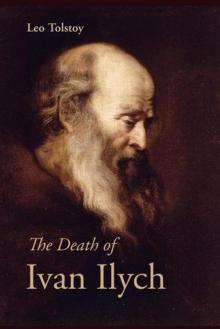 The Death of Ivan Ilych
The Death of Ivan Ilych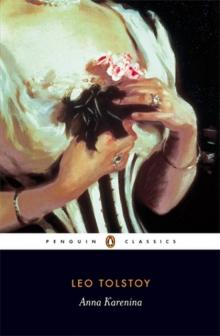 Anna Karenina
Anna Karenina Resurrection
Resurrection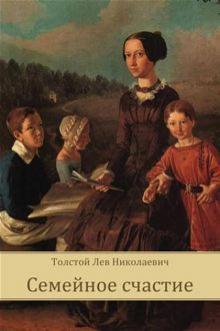 Family Happiness
Family Happiness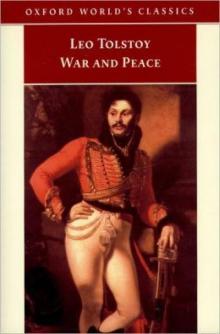 War and Peace
War and Peace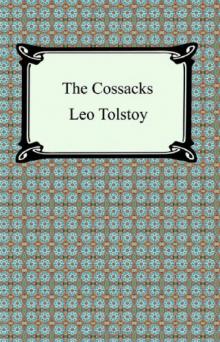 The Cossacks
The Cossacks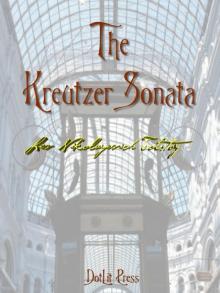 The Kreutzer Sonata
The Kreutzer Sonata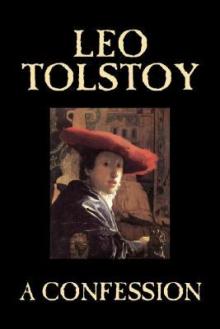 A Confession
A Confession The Kingdom of God Is Within You
The Kingdom of God Is Within You Father Sergius
Father Sergius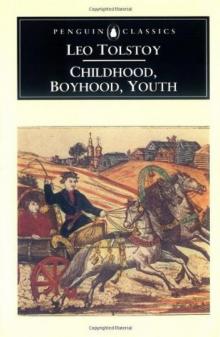 Childhood, Boyhood, Youth
Childhood, Boyhood, Youth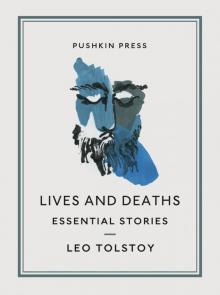 Lives and Deaths
Lives and Deaths The Devil
The Devil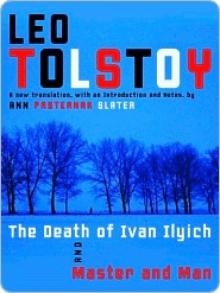 The Death of Ivan Ilyich and Master and Man
The Death of Ivan Ilyich and Master and Man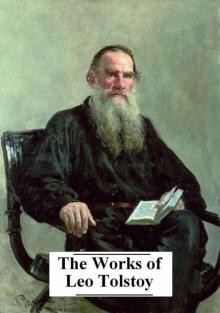 The Complete Works of Leo Tolstoy (25+ Works with active table of contents)
The Complete Works of Leo Tolstoy (25+ Works with active table of contents)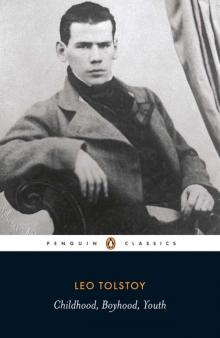 Childhood, Boyhood, Youth (Penguin ed.)
Childhood, Boyhood, Youth (Penguin ed.)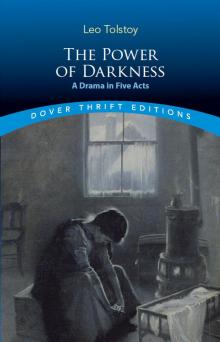 The Power of Darkness
The Power of Darkness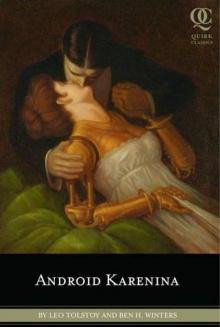 Android Karenina
Android Karenina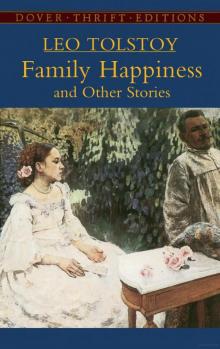 Family Happiness and Other Stories
Family Happiness and Other Stories The Lion and the Puppy
The Lion and the Puppy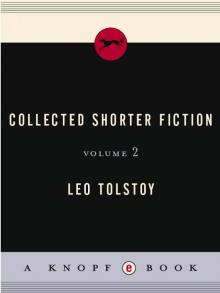 Collected Shorter Fiction, Volume 2
Collected Shorter Fiction, Volume 2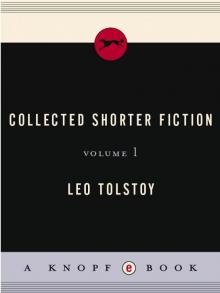 Collected Shorter Fiction, Volume 1
Collected Shorter Fiction, Volume 1